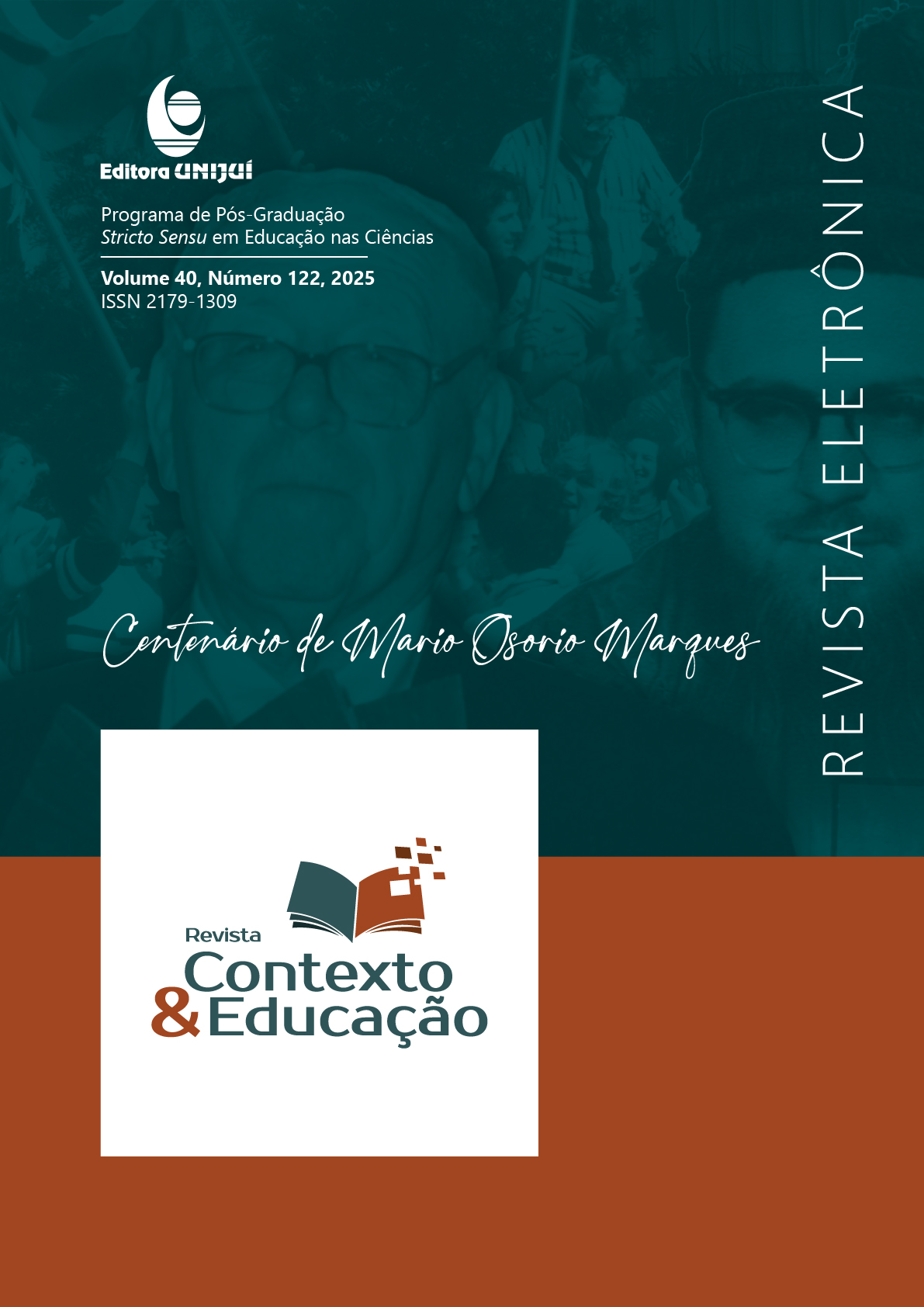Language and power structures: the university-school relationship in the political training of teachers
DOI:
https://doi.org/10.21527/2179-1309.2025.122.15897Keywords:
teacher training, language, unstested feasibilitiesAbstract
Written language at the University is often used to maintain power structures. Based on Freirean theory, this article discusses the potential of working with language through text within its context, considering micro and macro dimensions in teacher training.The objective of the article is to problematize these correlations of power in the relationship between university and school and the possible spaces for the construction of unstested feasibilities/inéditos viáveis in teacher training. The methodology is based on literature review and analysis of two activities carried out in the undergraduate course in Pedagogy in the second semester of 2023 and in the first semester of 2024. Based on the results, we found that students have been daring in their writing, reflecting a dialogue with the theory, based on pedagogically planned activities in disciplines, which invited undergraduates to articulate practice-theory, through written language.
References
BAKTHIN, Mikhail. Marxismo e filosofia da linguagem. 16.ed. São Paulo: Hucitec, 2014.
CAGLIARI, Luiz Carlos. Alfabetização e linguística. 10. Ed. São Paulo: Scipione, 2002.
CERTEAU, Michael de. A invenção do cotidiano: 1. Artes de fazer. Petrópolis – RJ: Vozes, 1994.
CLARO, A. L. de, SILVA, L. B. B. da., & PORTILHO, E. M. L. . (2022). Prática educativa: reflexão do professor na perspectiva freiriana no contexto da pandemia. Revista Contexto & Educação, 37(116), 76–89. https://doi.org/10.21527/2179-1309.2022.116.12670
FREIRE, Paulo. A importância do ato de ler. São Paulo: Moderna, 2003.
FREIRE, Paulo. Educação como prática da liberdade. 11. Ed. Rio de Janeiro: Paz e Terra, 1980.
FREIRE, Paulo. Pedagogia dos sonhos possíveis. Rio de Janeiro: Paz e Terra, 2015.
FREIRE, Paulo. Pedagogia do oprimido. 50.ed. Rio de Janeiro: Paz e Terra, 2011.
FREIRE, Paulo. Alfabetização: leitura do mundo, leitura da palavra. 10.ed. Rio de Janeiro: Paz e Terra, 2021.
FREIRE, Paulo. Considerações em torno do ato de estudar. In____. Ação cultural para a liberdade e outros escritos. 5. ed. Rio de Janeiro: Paz e Terra, 1981. p. 9-12.
GARCIA, Regina Leite. Reflexões sobre a responsabilidade social do pesquisador. In: GARCIA, Regina Leite. Para quem pesquisamos: para quem escrevemos - o impasse dos intelectuais. SP: Cortez, 2001.
GRAMSCI, Antônio. Os intelectuais e a organização da cultura. Rio de Janeiro: Civilização Brasileira, 1997.
HENRIQUES, Eda Maria de Oliveira. Dimensões subjetivas, sociais e formativas do aporte (auto)biográfico em educação: alguns aspectos epistemológicos e metodológico. In: Anais do Congresso Internacional de Pesquisa (Auto) Biográfica, VIII, São Paulo, SP, 2018, pp. 1-14.
LEFEBVRE, Henri. Critique de l avie quotidienne. Vol. I.: Introduction. Paris: L’Arche, 1958.
LEFEBVRE, Henri. Vers le cybernanthrope, contre les tecnocrates. Paris: Denoel-Gonthier, 1971.
LÜDKE, Menga; ANDRÉ, Marli. E.D.A. Pesquisa em educação: abordagens qualitativas. 2.ed. Rio de Janeiro: EPU, 2015.
MAAR, Leo. Prefácio de Wolfgang Leo Maar. In.: ADORNO, Theodor W. Educação e emancipação. Tradução: Wolfgang Leo Maar. Rio de Janeiro, 3ª edição, Editora: Paz e Terra, 1995.
RODRIGUES, Débora Marques; SANTOS, Sonia Regina Mendes dos. Práticas interativas: caminho para a constituição da docência. In: SOBREIRA, Henrique Garcia (org.). Educação, cultura e comunicação nas periferias urbanas. Rio de Janeiro: Lamparina, 2010, p. 99-116.
SANTOS, Miton. Por uma geografia nova. São Paulo: Hucitec, Edusp, 1978.
SANTOS, Milton. A natureza do Espaço: técnica e tempo, razão e emoção. São Paulo, Hucitec. 1997
SCHREDER, C., & FRISON, M. D. (2024). O uso da linguagem escrita como representação do pensamento: trajetórias infantis. Revista Contexto & Educação, 39(121), e13750. https://doi.org/10.21527/2179-1309.2024.121.13750
Downloads
Published
How to Cite
Issue
Section
License
Copyright (c) 2025 Revista Contexto & Educação

This work is licensed under a Creative Commons Attribution 4.0 International License.
By publishing in Revista Contexto & Educação, authors agree to the following terms:
All works are published under the Creative Commons Attribution 4.0 International License (CC BY 4.0), which allows:
Sharing — to copy and redistribute the material in any medium or format;
Adaptation — to remix, transform, and build upon the material for any purpose, even commercially.
These permissions are irrevocable, provided that the following terms are respected:
Attribution — authors must be properly credited, a link to the license must be provided, and any changes made must be indicated.
No additional restrictions — no legal or technological measures may be applied that legally restrict others from doing anything the license permits.
Notices:
The license does not apply to elements that are in the public domain or covered by legal exceptions.
The license does not grant all necessary rights for specific uses (e.g., image rights, privacy, or moral rights).
The journal is not responsible for the opinions expressed in the articles, which are the sole responsibility of the authors. The Editor, with the support of the Editorial Board, reserves the right to suggest or request modifications when necessary.
Only original scientific articles presenting research results of interest that have not been previously published or simultaneously submitted to another journal with the same purpose will be accepted.
Mentions of trademarks or specific products are intended solely for identification purposes and do not imply any promotional relationship by the authors or the journal.
License Agreement (for articles published from October 2025): Authors retain the copyright to their article and grant Revista Contexto & Educação the right of first publication.


